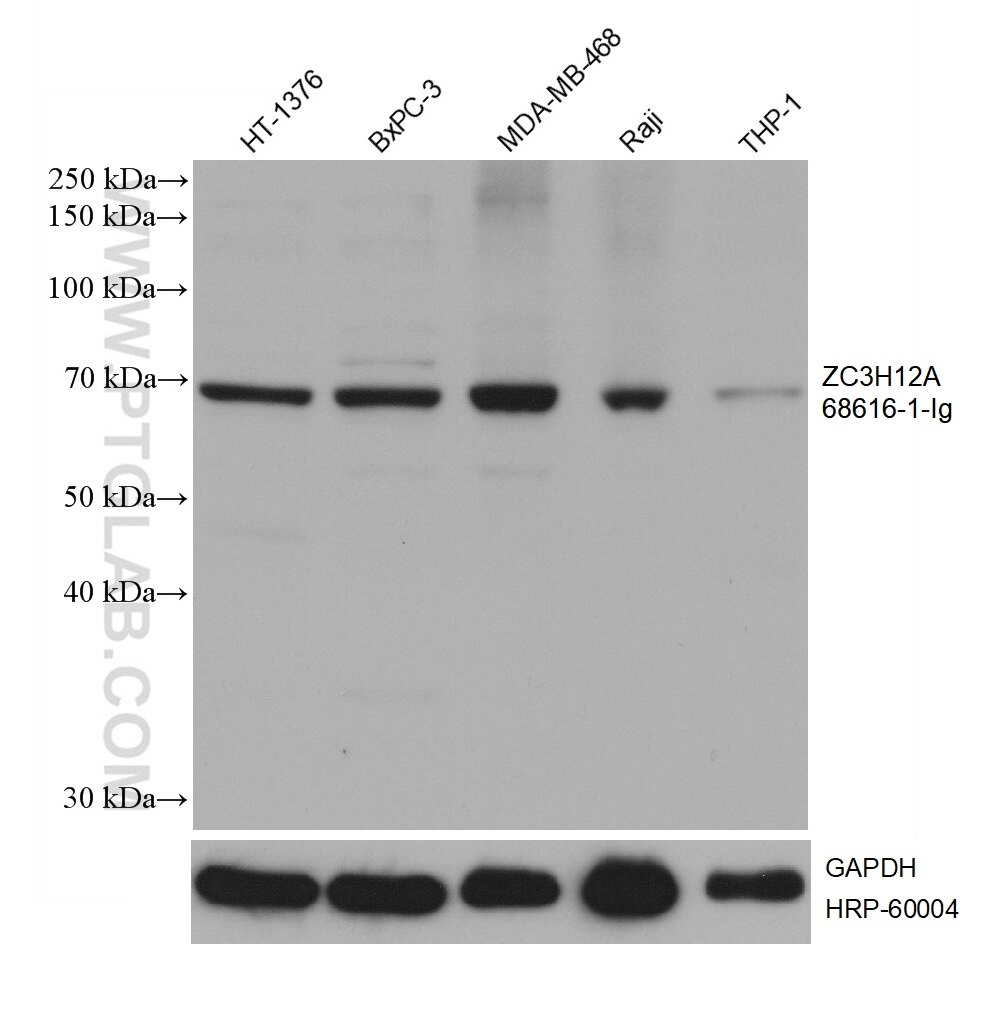ZC3H12A Monoklonaler Antikörper
ZC3H12A Monoklonal Antikörper für WB, ELISA
Wirt / Isotyp
Maus / IgG1
Getestete Reaktivität
human
Anwendung
WB, ELISA
Konjugation
Unkonjugiert
CloneNo.
2F6B2
Kat-Nr. : 68616-1-Ig
Synonyme
Geprüfte Anwendungen
| Erfolgreiche Detektion in WB | HT-1376 cells, BxPC-3-Zellen, MDA-MB-468-Zellen, Raji-Zellen, THP-1-Zellen |
Empfohlene Verdünnung
| Anwendung | Verdünnung |
|---|---|
| Western Blot (WB) | WB : 1:5000-1:50000 |
| It is recommended that this reagent should be titrated in each testing system to obtain optimal results. | |
| Sample-dependent, check data in validation data gallery | |
Produktinformation
68616-1-Ig bindet in WB, ELISA ZC3H12A und zeigt Reaktivität mit human
| Getestete Reaktivität | human |
| Wirt / Isotyp | Maus / IgG1 |
| Klonalität | Monoklonal |
| Typ | Antikörper |
| Immunogen | ZC3H12A fusion protein Ag13877 |
| Vollständiger Name | zinc finger CCCH-type containing 12A |
| Berechnetes Molekulargewicht | 599 aa, 66 kDa |
| Beobachtetes Molekulargewicht | 66 kDa |
| GenBank-Zugangsnummer | BC005001 |
| Gene symbol | ZC3H12A |
| Gene ID (NCBI) | 80149 |
| Konjugation | Unkonjugiert |
| Form | Liquid |
| Reinigungsmethode | Protein-G-Reinigung |
| Lagerungspuffer | PBS with 0.02% sodium azide and 50% glycerol |
| Lagerungsbedingungen | Bei -20°C lagern. Nach dem Versand ein Jahr lang stabil Aliquotieren ist bei -20oC Lagerung nicht notwendig. 20ul Größen enthalten 0,1% BSA. |
Hintergrundinformationen
ZC3H12A, also named as MCPIP or MCPIP1, is a 599 amino acid protein, which contains one C3H1-type zinc finger and belongs to the ZC3H12 family. ZC3H12A localizes in the cytoplasm and nucleus. Increased expression of ZC3H12A is associated with ischemic heart disease. ZC3H12A has RNase activity and selectively degrades specific target mRNA species and modulates the immune response and inflammation by regulating the decay of specific mRNA molecules.
Protokolle
| PRODUKTSPEZIFISCHE PROTOKOLLE | |
|---|---|
| WB protocol for ZC3H12A antibody 68616-1-Ig | Protokoll herunterladen |
| STANDARD-PROTOKOLLE | |
|---|---|
| Klicken Sie hier, um unsere Standardprotokolle anzuzeigen |


